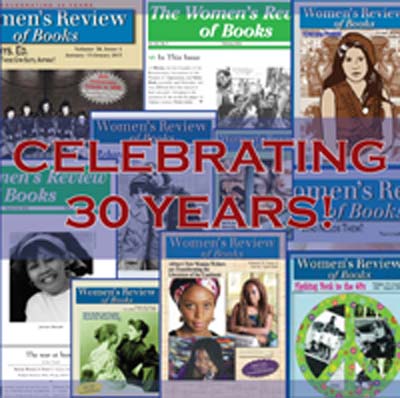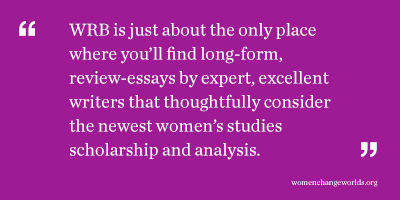
Reprinted from the January/ February 2013 Women's Review of Books.
Longevity, I tell people who compliment me on my age (sixty) and youthful (apparently) looks, is not a sign of virtue. In my case, it’s simply dumb luck: a combination of good genes, a middle-class upbringing, and a job that provides me with health insurance. Yet for a small-circulation, special-interest publication like Women’s Review of Books, reaching a great age is an achievement. The year WRB was founded, 1983, was a boom time for feminist publishing—of books, newspapers, magazines, and journals, as well as ’zines, leaflets, manifestos, and graffiti. Little of that survives, but Women’s Review of Books is still hanging on.
I attribute this to many factors. For one thing, WRB is, for better or worse, still necessary. Disgracefully, even after forty years of the contemporary women’s movement, feminist scholarship and critical analysis, and women’s creative writing, receive little more attention in the mainstream media in 2013 than they did in 1983. Unlike in 1983, when WRB and our sister publications could cover just about every feminist work that appeared, these days university, small, and even trade publishers are releasing an outpouring of interesting, challenging, original books by women. Yet most of this is ignored by daily newspapers, glossy magazines, and book review publications like the New York Review of Books. When it’s not ignored, it’s often treated fleetingly or dismissively: and the well-deserved prizes and recognition that writers like Joan Didion (an NYRB regular), Adrienne Rich (lauded more enthusiastically after her death last year than she often was in life), or Louise Erdrich (winner of this year’s National Book Award) do not mitigate the situation. WRB is just about the only place where you’ll find long-form, review-essays by expert, excellent writers that thoughtfully consider the newest women’s studies scholarship and analysis. I’m regularly surprised by the lack of overlap between WRB’s coverage and that in the New York Times, for example. And WRB is by no means comprehensive: we do what we can in six issues per year, 32 pages per issue. There are a lot of worthy books out there that we miss, and getting old doesn’t mean we are getting complacent. We are always striving to do better.
Secondly, like me, Women’s Review of Books has been lucky in its parentage. Since we were founded, by Wellesley College Professor Linda Gardiner, we have been housed at the Wellesley Centers for Women (WCW), a gender-focused, research and action organization located at the college. WCW not only provides office space, computers, and other invaluable infrastructure; the organization has also come to our rescue during financial crises, offered personal support to the staff, and cheered on our accomplishments. In 2005, when we had to suspend  publication because we had, basically, run out of money, WCW partnered with Old City Publishing, a publisher of scholarly journals, to get Women’s Review of Books back on our feet and to restructure financially.
publication because we had, basically, run out of money, WCW partnered with Old City Publishing, a publisher of scholarly journals, to get Women’s Review of Books back on our feet and to restructure financially.
Since WRB’s founding, we have been developing an extensive network of writers and informal advisors among feminist scholars, activists, and journalists. As a result, as editor, I can always find a writer to say something interesting, intelligent, and even illuminating about any book we decide to assign. The journal’s reputation is such that I’ve discovered I can cold call just about any feminist, no matter how exalted, and she will take seriously my invitation to review for us.
Of course, this is in part because at WRB, our terrific writers encounter a high-quality audience of activists and avid readers, one that appreciates their ideas, grapples with them, applies them in the world, and even extends them further.
So, the sources of WRB’s fountain of youth have been our relevant mission and the support of our parent organizations, our writers, and our audience. Perhaps one day a book review publication dedicated to women’s studies and creative writing will no longer be necessary—but until then, Women’s Review of Books is here to stay.
Amy Hoffman, MFA, is editor-in-chief of the Women’s Review of Books at Wellesley Centers for Women, Wellesley College. A writer and community activist, her newest book, the memoir entitled Lies About My Family, will be published this spring by the University of Massachusetts Press.


